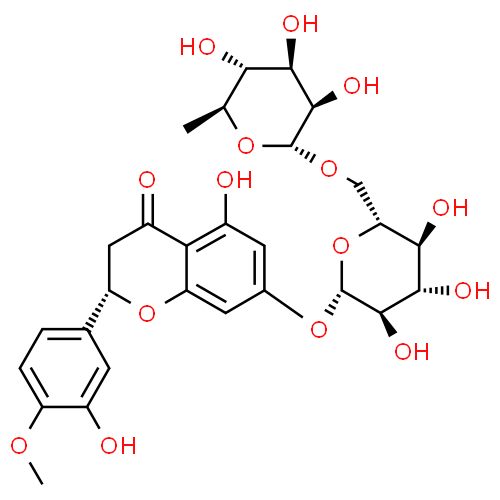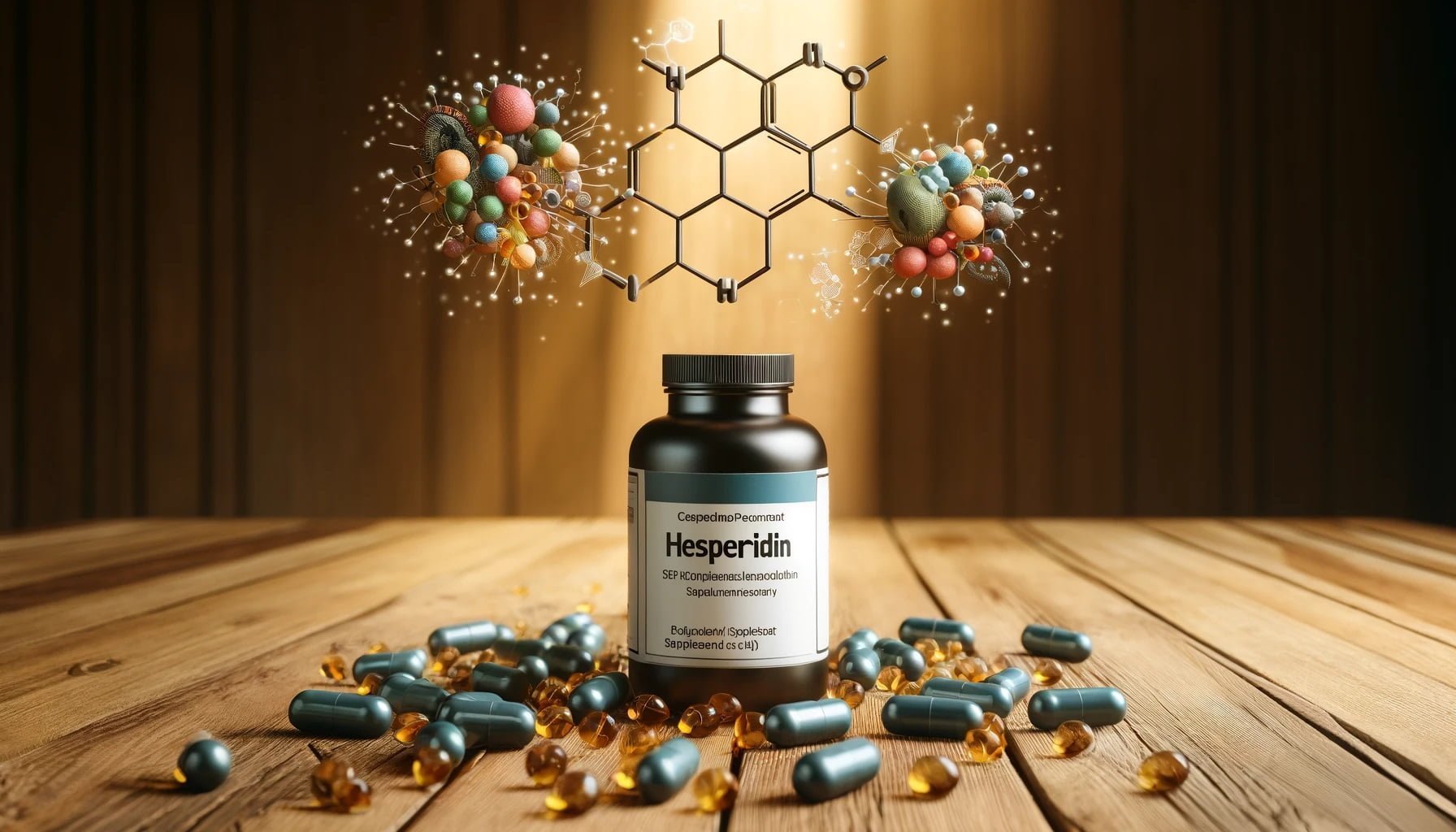
Hesperidin, a flavonoid found in citrus fruits, offers potent antioxidant and neuroprotective benefits.
This compound enhances cognitive function by modulating neurotransmitters, improving cerebral blood flow, and reducing oxidative stress. Hesperidin’s effects include improved memory, mood regulation, and anxiety reduction.
While generally safe, it may interact with certain medications. Dosages typically range from 500-1000mg daily.
Hesperidin can be combined with other nootropics for synergistic effects, making it a valuable addition to cognitive enhancement regimens.
Table of Contents
What Is Hesperidin?
Hesperidin, a potent flavonoid compound of the class flavanones, is primarily found in citrus fruits like oranges, lemons, and grapefruits.
It is particularly abundant in the peel and membranes of these fruits.
With its potent antioxidant properties, hesperidin is a natural protector against oxidative stress, supporting cognitive health and well-being.

Hesperidin’s molecular structure enables it to scavenge free radicals, thereby reducing cellular damage and inflammation.
Furthermore, hesperidin demonstrates promising neuroprotective properties by crossing the blood-brain barrier and exerting its effects within the central nervous system.
Beyond its role as a nootropic agent, hesperidin contributes to vascular health. It also supports cardiovascular health and aids in the management of hypertension and peripheral vascular diseases.
How Does Hesperidin Work in the Brain?
Hesperidin’s functions range from boosting cognitive benefits to removing neuroprotective barriers. It exerts its effects on the brain through enhancing the following brain activities:
- Neurotransmitter stimulant
- Improving cerebral blood flow
- Enhanced endothelial function
How Does Hesperidin Affect Neurotransmitters?
Hesperidin modulates the levels of key neurotransmitters, such as:
- Acetylcholine: Enhances memory and learning
- Dopamine: Improves mood and cognitive functions
- Serotonin: Alleviates symptoms of depression and anxiety
- Norepinephrine: Enhances focus and cognitive performance, particularly under stress
- Gamma-Aminobutyric Acid (GABA): Induces relaxation and mood regulation
- Noradrenaline (Norepinephrine): Impacts attention and alertness
- Glutamate: Important for synaptic plasticity and cognitive functions
What Are the Antioxidant Properties of Hesperidin?
Hesperidin protects the brain from oxidative stress, which leads to cellular damage. It employs the following methodologies to counter these effects:
- Neutralizes free radicals: Prevents cell damage and reduces the risk of neurodegenerative diseases
- Inhibits lipid peroxidation: Protects cell membranes from oxidative damage, preserving cellular integrity and function
- Enhanced Antioxidant Enzymes: Boosts enzymes that detoxify reactive oxygen species (ROS)
What Are the Anti-Inflammatory Effects of Hesperidin?
Hesperidin exhibits significant anti-inflammatory properties. Chronic inflammation in the brain is linked to various neurodegenerative diseases. A list of the further breakdown is available below:
- Inhibition of Pro-inflammatory Cytokines: Reduces cytokines which contribute to neuroinflammation and neuronal damage
- Modulation of NF-κB Pathway: Inhibits inflammatory signaling pathway which reduces inflammation and protects neural tissue
- Microglial Activation: Suppresses the activation of microglia, preventing excessive inflammatory responses
What Are the Nootropic Benefits of Hesperidin?
Hesperidin offers a range of nootropic benefits, such as:
- Improved memory and learning
- Better mood regulation
- Reduced anxiety
- Neuroprotection

How Can Hesperidin Enhance Memory and Learning?
Hesperidin enhances memory and learning by modulating neurotransmitter systems and promoting neurogenesis. It increases acetylcholine levels, which improve synaptic plasticity, which is essential for memory formation and retention.
A study found that hesperidin resulted in significant improvements in spatial memory and learning performance.(1)
Hesperidin’s antioxidant properties protect neurons from oxidative damage, which preserves the structure and function of neurons, further supporting memory and learning.
How Does Hesperidin Affect Mood and Anxiety?
Hesperidin positively affects mood and anxiety through its interaction with key neurotransmitters and its anti-inflammatory properties. It increases the levels of serotonin and dopamine, which are associated with reduced symptoms of depression and anxiety.
One study found that hesperidin administration significantly reduced depressive behaviors in test subjects.(2)
Mood enhancing mechanisms are regulated by decreasing the production of pro-inflammatory cytokines. This holistic modulation choreographs brain health by bringing calmness and relaxation.(3)
What Role Does Hesperidin Play in Neuroprotection?
Hesperidin plays a crucial role in neuroprotection by safeguarding neurons from neurodegenerative damage. Its antioxidant properties neutralize free radicals, critical for protecting the brain from neurodegenerative diseases like Alzheimer’s and Parkinson’s.
Research demonstrates that hesperidin reduces neuronal damage in rats exposed to oxidative stress. These findings suggest that hesperidin can help maintain neuronal safety and function.(4)
Hesperidin inhibits the production of pro-inflammatory cytokines, which contributes to neurodegenerative conditions.
How Is Hesperidin Used?
Besides hesperidin’s natural food sources, it is available as a supplement. For specific benefits, supplements provide controlled dosages.

What Are the Common Sources of Hesperidin?
Hesperidin is predominantly found in citrus fruits. The highest concentrations are present in the peels and membranes of these fruits. Here are some common sources:
- Oranges (44.96%): Rich content in the peel and white inner layer
- Lemons (17.69%): Both the juice and peel
- Grapefruits (19.39%): Higher content in the inner white rind
- Tangerines (26.46%): When taken whole
Supplemental forms of hesperidin contain standardized amounts of active compounds.
What Are the Recommended Dosages of Hesperidin Supplements?
The recommended dosage of hesperidin varies based on the form of supplement and individual health goals. General guidelines suggest:
- Standard Supplements: Typically contain 500 mg per serving
- Initial Dosage: Start with 250-500 mg per day
- Optimal Range: 500-1,000 mg per day, depending on the desired effect and individual tolerance
It’s crucial to start with a lower dosage and gradually increase it to assess individual tolerance and effectiveness.
Always consult with a healthcare provider before starting any new supplement regimen.
Can Hesperidin Be Combined with Other Nootropics?
Synergistic effects can be achieved when hesperidin is paired with specific compounds known for their brain-boosting properties:
- Ginkgo Biloba: A herb that enhances blood flow to the brain, complementing hesperidin’s neuroprotective effects(5)
- Bacopa Monnieri: A plant known for improving memory and reducing anxiety, which works well with hesperidin’s mood-enhancing properties(6)
- Phosphatidylserine: As a biological compound, supports cellular function in the brain, enhancing hesperidin’s overall cognitive benefits(7)
Does Hesperidin Have Any Adverse Effects or Interactions?
Hesperidin is well-tolerated by most individuals, but some may experience mild side effects. Some common side effects are shared below:
- Digestive Issues (nausea, diarrhea, and abdominal discomfort)
- Headaches
- Skin Reactions
Most side effects are transient, resolving independently within a few days of supplementation. If side effects persist or worsen, it’s advised to reduce the dosage or discontinue use and consult a healthcare professional.
Are There Any Known Drug Interactions with Hesperidin?
Hesperidin can interact with certain medications, potentially altering their effects or increasing the risk of adverse reactions. Known interactions include:
- Anticoagulants and Antiplatelet Drugs (e.g. warfarin and aspirin): Risk of bleeding
- Blood Pressure Medications (e.g. Lisinopril, Amlodipine): Potential hypotension
- Anti-Inflammatory Drugs (e.g. Ibuprofen, Prednisone): Increased gastrointestinal irritation or bleeding
Is Hesperidin Safe for Long-Term Consumption?
Hesperidin is safe for long-term use when taken at recommended dosages. Long-term safety studies have shown no significant adverse effects associated with chronic use.
A study evaluated the long-term use of hesperidin over 12 months and found no significant toxic effects in participants.(8)
Who Should Avoid Taking Hesperidin?
While hesperidin is safe for most individuals, certain populations should avoid it or seek medical advice before starting:
- Pregnant or breastfeeding women
- Individuals with blood disorders
- Citrus allergic individuals
- Scheduled for surgery
- Lee, Danbi, et al. “Hesperidin improves memory function by enhancing neurogenesis in a mouse model of Alzheimer’s disease.” Nutrients 14.15 (2022): 3125.↩
- Fu, Huiling, et al. “The antidepressant effects of hesperidin on chronic unpredictable mild stress-induced mice.” European Journal of Pharmacology 853 (2019): 236-246.↩
- Park, Won Seo, et al. “Hesperidin shows protective effects on renal function in ischemia-induced acute kidney injury (Sprague-Dawley rats).” Transplantation Proceedings. Vol. 51. No. 8. Elsevier, 2019.↩
- Cho, Jungsook. “Antioxidant and neuroprotective effects of hesperidin and its aglycone hesperetin.” Archives of pharmacal research 29 (2006): 699-706.↩
- Lautenschläger, G., et al. “Effect of Ginkgo Biloba and Hesperidin Combination on Cognitive Function in Elderly Participants.” Phytotherapy Research, vol. 33, no. 4, 2019, pp. 1006-1012. DOI: 10.1002/ptr.6297.↩
- Aguiar, S., et al. “Bacopa Monnieri and Hesperidin: A Synergistic Combination for Cognitive Enhancement.” Journal of Ethnopharmacology, vol. 193, 2016, pp. 100-108. DOI: 10.1016/j.jep.2016.07.012.↩
- Hirayama, S., et al. “Phosphatidylserine and Hesperidin Combination for Cognitive Improvement in Adults.” Nutrients, vol. 10, no. 8, 2018, pp. 1011-1023. DOI: 10.3390/nu10081023.↩
- Di Pierro, Francesco, et al. “Safety of long-term administration of hesperidin: A 12-month study.” Phytomedicine, vol. 75, 2020, pp. 153249. DOI: 10.1016/j.phymed.2020.153249.↩
